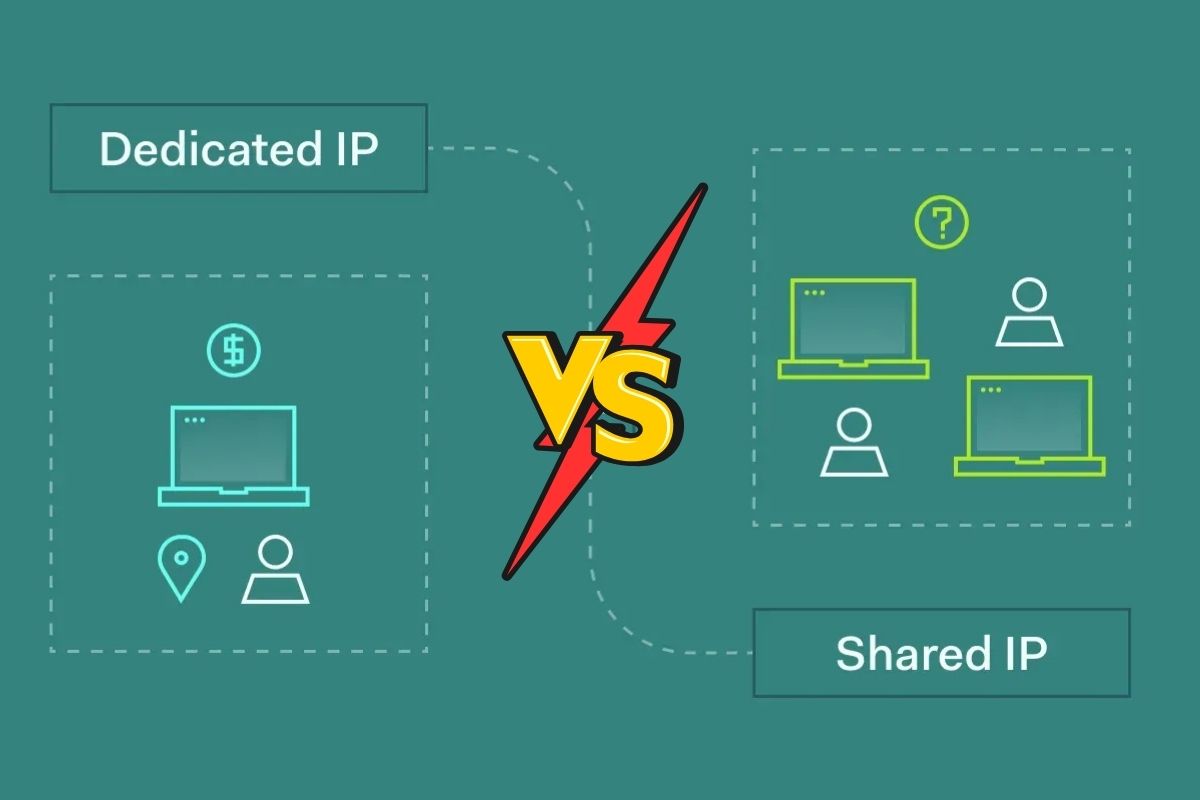Nowadays, almost every organization is normalizing a remote workspace. Remote workspace opens doors to a large talent pool. At the same time, it increases the risks of potential cyber-attacks. This is because workers are sharing private information about their company outside of their offices. So, a remote workspace requires advanced security protocols. When talking about workspace security, a Dedicated IP is an effective tool to increase your security against potential attackers as you do not share your IP with anyone else.
IP Address stands for “Internet Protocol,” an exclusive address that recognizes devices on the internet or across a local network. IPs allow devices to communicate with each other and send and receive data on the internet. Since there are billions of computers, websites, and routers on the internet, IP addresses allow distinguishing between them as a unique IP is dedicated to each website and device.
Shared and Dedicated IPs are two main categories of IP Addresses. There is a lot of hype among people regarding comparing the two. Here is your ultimate guide to the difference between Dedicated and Shared IPs and how they affect your remote workspace.
What is a Dedicated IP?
A dedicated IP is an exclusive IP for a given remote workspace and cannot be changed. Dedicated IPs allow people to find a remote workspace on the internet without entering the domain name. Since you do not share your IP with anyone, a Dedicated IP would benefit your remote workforce. It gives you security against potential hackers and reduces cyber threats in today's digitized era. A Dedicated IP not only provides your remote workspace with extra protection and enhances your site’s performance. Click here to know more about the benefits of a Dedicated IP.
As IPs are numerical and hard to remember, domain names were assigned to IPs. A shared IP means that your domain contains an IP address assigned to various other domains as well. When you hire shared hosting services, they host hundreds of remote workspaces on a common server. So, all remote workspaces share a common IP on that server. They stay active for a short time and then die. Then, another IP is assigned to your server or you can request one.
Due to the increased remote workforce, the demand for robust security systems has also increased. So, it is necessary to understand the key differences between a Shared and Dedicated IP so that you can make a better choice while going for remote workspace hosting.
Improved Security
As mentioned above, a Shared IP is assigned to various other domains at the same time. On the other hand, Dedicated IP is not associated with any other domain. So, using a Dedicated IP enhances your remote workspace’s Security and Speed. Since you are the only one that is using that exclusive IP, your remote workspace can never be blacklisted unless you are involved in some spam activities.
Pull Your Remote Workspace Through IP
Another important feature that differentiates between Shared and Dedicated IPs is pulling your remote workspace through IP. By using a Dedicated IP, you can easily view your remote workspace without entering a domain name. You can also easily access your remote workspace via FTP during domain generation, which is impossible if you use a Shared IP.
Enhanced Speed
Since a Dedicated IP is dedicated to your domain only, your remote workspace will positively respond to the heavy traffic. On the other hand, a Shared IP makes it difficult for your remote workspace to load during heavy traffic. As a Dedicated IP will have less traffic, it enhances your site’s speed and it loads smoothly.
Stability
When you use a Shared IP, it increases the risks of IP blacklisting. As a Shared IP contains various domains on a Single server, every domain on the server gets blocked if any of them is involved in illegal activities. In contrast, there are no chances of blacklisting your IP while using a Dedicated IP unless you do something against the rules of search engines. So, you do not have to suffer because of other users’ spamming activities and it protects your brand’s reputation.
When we talk about Emails, Dedicated IPs would be relatively more beneficial since a shared IP address can lower your email's delivery rate. A Dedicated IP also enhances your emails’ potential to access your clients' inboxes. When you choose a Shared IP for sending emails, you use the IP your host has dedicated to your remote workspace. So if something happens wrong with the system, the IP can be considered spam and can be blacklisted. So when it gets blocked, it also affects the email services associated with the IP. A Dedicated IP ensures that your emails are not considered spam.
SSL Security and Importance of a Dedicated IP
When you handle a remote workspace, you will need an SSL protocol to build trust among your customers that their login information is safe with you. For this, you will need a Dedicated IP. A Dedicated IP ensures that the information exchanged between the remote workspace and the server is encrypted. Additionally, a Dedicated IP also ensures the fast loading of a remote workspace that positively affects your productivity and on-time delivery.
Protected Remote Access
With the introduction of a remote workforce, the need to strengthen security protocols has also increased. Dedicated IPs enable a remote workforce to connect with an organization’s cloud computing network securely. If any suspicious activity occurs, you can easily identify it as every worker contains an exclusive IP. In contrast, Shared IPs do not provide that security to your remote workspace.
Conclusion
When we talk about the characteristics of both IPs, it is evident that Dedicated IP possesses an edge over Shared IP. In today’s digitized context where remote workspace is trending, Dedicated IP allows you to connect with the remote workspace securely. It provides greater protection against cyber threats as compared to Shared IP. Additionally, Dedicated IP also improves your remote workspace’s speed, enhancing your SEO ranking.





